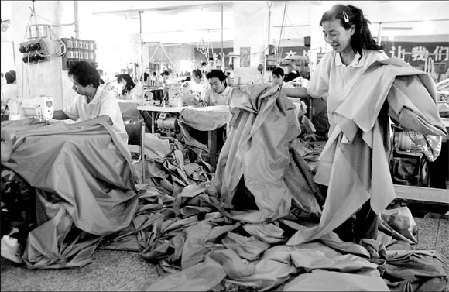
Workers at the Beijing Wuzhou Guardtex New Type Material Co Ltd make tents around the clock.
Busy sewing white gauze on a blue cloth to make the window of a tent, 23-year-old Li Shidi rarely raises her head.
The middle finger of her right hand is covered with purple disinfectant after injuring herself, but that couldn't stop the determined seamstress.
For her and her colleagues cannot stop, as trucks charged with carrying more than 1,000 tents every five days to Sichuan wait outside the factory.
Located right beside the third ring road in south Beijing, the factory is one of 75 tent makers in China appointed by the Ministry of Civil Affairs to work day and night to make 900,000 tents before June 20 for tens of millions of refugees rendered homeless by the May 12 earthquake.
At this Beijing factory, around 200 workers are as busy as Li.
Their workdays start at 8 am and, except for a couple of brief breaks, continue into the night.
Then, when Li and her co-workers go to their dorms to rest, another group replaces them to keep the machine working.
"Workers take rests in shifts, but the machines never stop working," Guo Shudi, a spokeswoman with Beijing Wuzhou Guardtex New Type Material Co Ltd, said.
In fact, the sewing machines here haven't stopped since May 19, when the Ministry of Civil Affairs ordered 8,000 tents from the factory.
The company that normally makes shelters, garments and tents is now producing tents exclusively.
"We have got to use all our force to ensure the tents are made," Guo, who helps in the factory everyday after her regular office work, said.
For the past 10 years, the once state-owned firm has made tents for the government body for the state's reserves and in time of natural and manmade disasters.
Li remembers that during the tsunami in Indonesia in 2004, when she was 19 and new to the factory, she sewed tents for disaster survivors.
"We had been busy working when disasters happened before, but we have never been as nervous as this time because the demand is huge and urgent," Guo, who has been working for the company for over 25 years, said.
Other garment factories in Beijing have sent their workers to help out and ensure the deadlines are met.
The target now is to make 8,000 tents by the end of June, which amounts to about 300 tents a day.
And Guo said they might have to make more.
Sitting opposite Li is 19-year-old Liu Songli, who helps her move cloth for the tent as she operates the sewing machine.
Liu came to Beijing at the beginning of the year to work in a toy factory.
"I came when my boss asked me to come," Liu said.
"I know it is for people in Sichuan," he said.
(China Daily May 28, 2008)